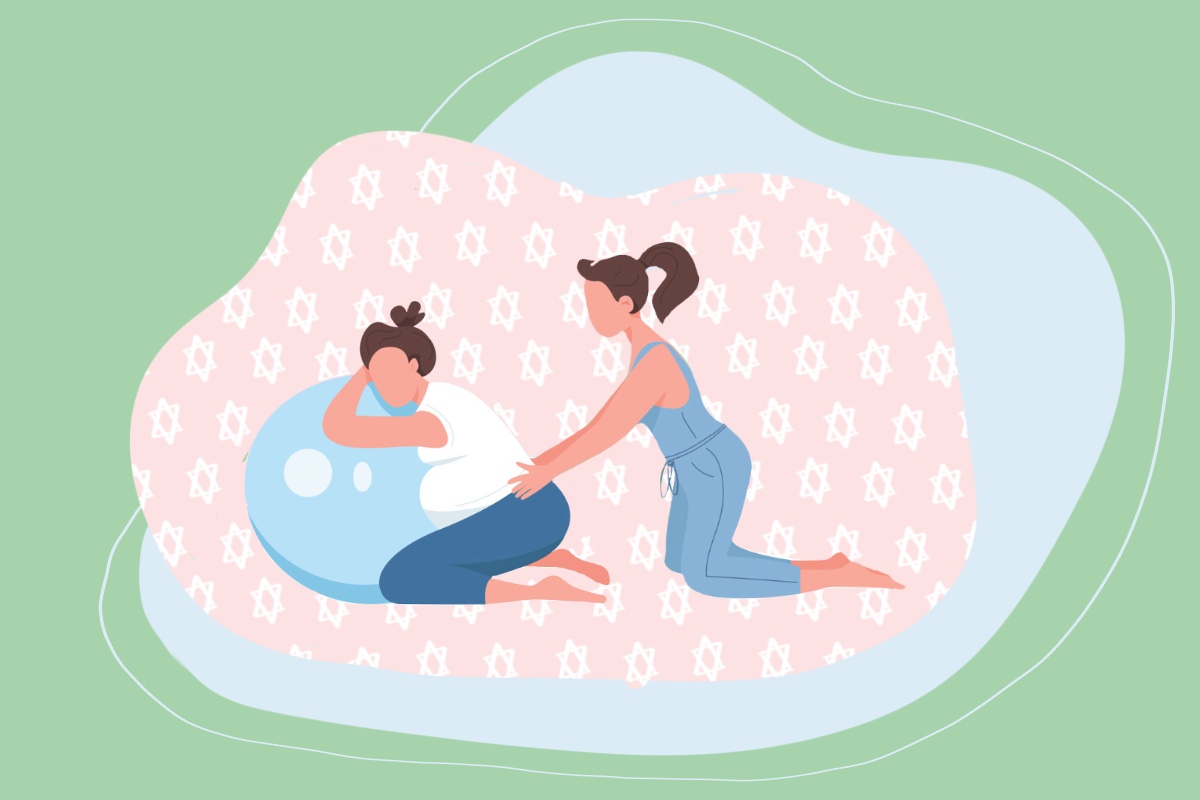In contemporary birthing circles, there is more and more talk of doulas. Doulas generally offer physical, emotional and informational support during pregnancy, labor, birth and the immediate postpartum period. For Jews and their loved ones, there might even be more compelling reasons to have doula support at birth — and there’s actually a rich tradition in Judaism of having a birthworker present.
I was a rabbi before I became a Jewish-focused doula. At the moment when I was struggling with a difficult birth, I realized that I had never been taught anything in any of my graduate-level Jewish studies and rabbinic training programs that had to do with pregnancy or birth. I found myself googling Jewish songs, blessings and images related to birth. Let me tell you: This is not what you want to be doing in between contractions.
So much of what has belonged to traditionally women’s knowledge in Judaism has been buried and needs uncovering. A Jewish doula can help fill in those gaps and serve as a guide for people looking for a spiritual birth experience.
The tradition of having a Jewish doula or birthworker stems largely from two (frankly, problematic) ideas: the first is that men traditionally saw birth as the realm of women (and traditionally trans/nonbinary people were not considered part of the breakdown of gender roles at all). Secondly, the rules of niddah (known as the “female purity laws”) stipulate that a man can’t touch a woman if she is bleeding, which precludes physical birth support. For this reason, Jews giving birth always had women present either as midwives or support birthworkers or both. To me, these are not ideal reasons to have doula support, but they offer meaningful opportunities for reclamation.
For my clients, gender does not play a role and we don’t need to follow the rules of niddah. In fact, part of my role is helping birth partners and support people (of any gender) learn how to offer physical support during a birth. People don’t often realize that a doula is there to support the birth partner just as much as the person giving birth. Think of it this way: Would you want to coach a sport that is new to you, without even having watched a game? That’s how birth partners often feel. It makes sense to have a birthworker present who isn’t in charge of all the medical checks who can help guide the partner in offering support, and who can take over if a partner/support person needs a break.
As a Jewish doula, I do all of the usual physical, emotional and informational support, and I also add a spiritual dimension to birth. For many, giving birth is one of the most intensely meaningful moments of our lives. It makes sense to imbue it with a sense of spirituality.
In my doula work, I work with women and birthers of all genders who identify across the Jewish spectrum. As a secular rabbi I often work with people who are secular/cultural Jews and their loved ones, many of whom are intermarried and/or from diverse families. I can tailor the Jewish rituals and spiritual teachings to folks according to their values and preferences. For some people, prayer is meaningful. For others, they wish to connect with Jewish text and ritual in a more secular way. There are great options for everyone.
For example, I use traditional blessings, either from Psalms or tekhines, which are prayers written in Yiddish, often by women themselves. I also use modern poetry and other readings for birth, such as excerpts from Anita Diamant’s “The Red Tent.” I give examples of birth art to use as focal points and meditations rooted in Talmud and other Jewish texts. These readings and images remind us of the long line of other parents that we are joining. The words provide comfort and solace, grounding the significant experience of birth in tradition.
We also use the tradition of the mikveh to aid in birth preparation or healing. With options including traditional and secular blessings, some visit a traditional mikveh and others simply use a lake or swimming pool. In any context, the ritual bath serves many purposes. It can be a chance to mark the transition into parenthood. It can offer a sense of renewal to ready for birth or to heal from it. In some cases, a group does a dunk/swim together and it’s a chance for a spiritual bonding moment with the closest people in someone’s life.
I’m proud to continue a long line of birthworkers that Jews have had by their sides during birth for millennia. When I was struggling in labor, I was desperate for Jewish ritual, connection and support. I ultimately became the doula I wished I had. We seek Jewish leadership for so many significant moments in life, so it makes sense that at what is for many of us the most intense and powerful moment of our lives — the moment of giving birth — we mark it spiritually. It is my wish that we can all feel meaningfully cared for and supported at the significant, spiritual time of pregnancy, labor, birth and postpartum. We deserve nothing less.
If you are seeking a Jewish doula there are likely some in your area. Check out Imeinu Doulas, a great birthworker network for Jews. Many of us also support people with online birth plans, so even if there isn’t a Jewish doula near you, we can work with an in-person doula and provide help creating a spiritual birth plan.








